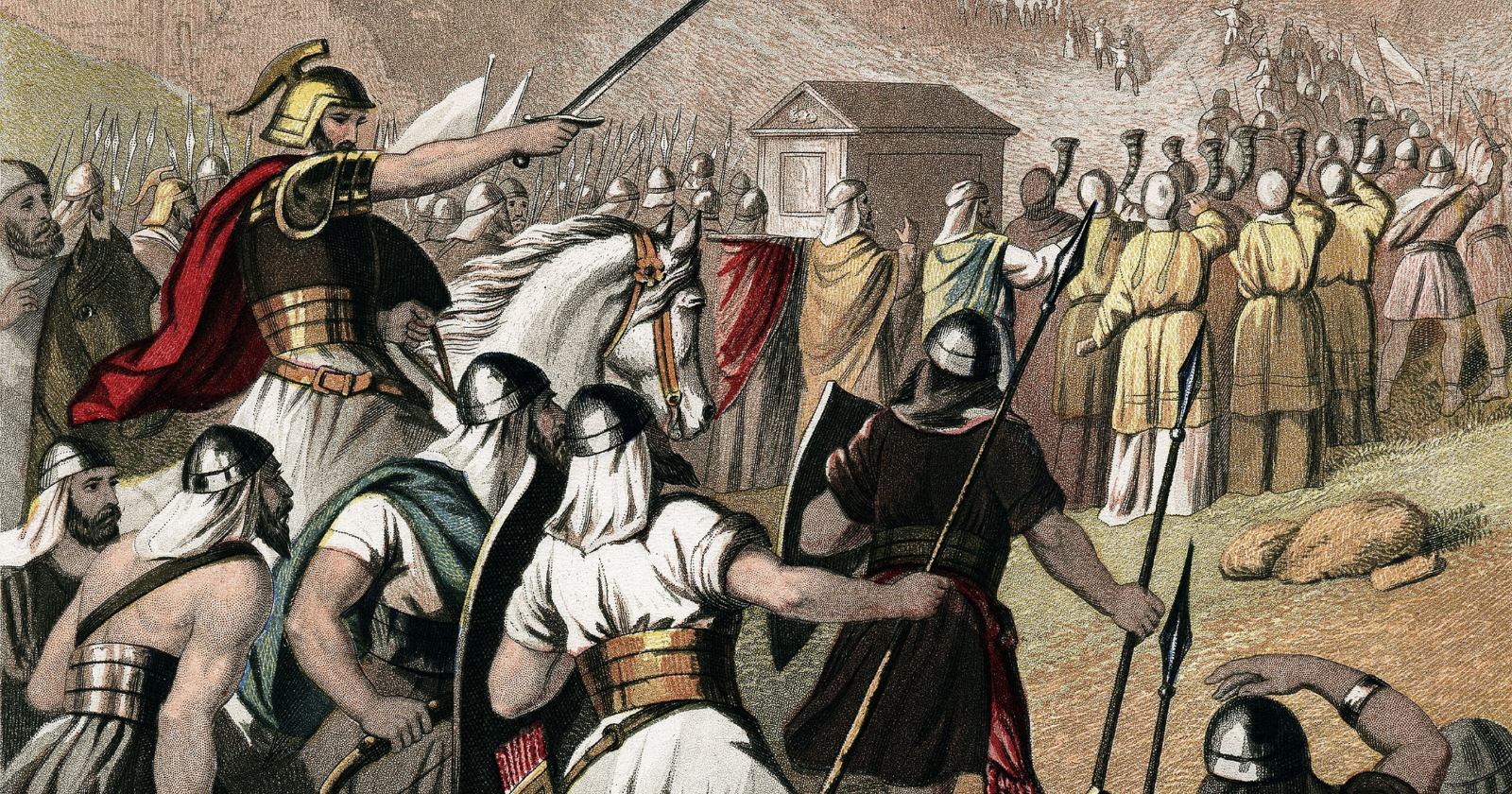“Be strong and courageous. Do not be afraid; do not be discouraged, for the Lord your God will be with you wherever you go.”
Joshua 1:9
Stepping into the unknown often requires more than just physical readiness, right?
At least, it demands a deep spiritual foundation.
The Book of Joshua serves as a powerful narrative that unfolds this truth, revealing the complexities of faith, leadership, and perseverance.
As Joshua leads the Israelites across the threshold into the Promised Land, their journey mirrors the challenges and triumphs we face in our own quests for spiritual and personal fulfillment.
This article delves into 5 pivotal lessons drawn from their experiences, offering guidance for anyone navigating life’s battles.
From confronting fears to embracing unity, these insights from the Book of Joshua are more than historical recountings. They are stepping stones for anyone looking to deepen their wisdom and strengthen their faith.
Joshua’s historical journey
The Book of Joshua is a cornerstone of biblical history, capturing the Israelites’ transition from wanderers to settlers in the Promised Land.
It’s a narrative of conquest and fulfillment, with God’s promises to Joshua, Moses’ successor, taking center stage.
The text divides neatly:
Initial chapters recount the Jordan crossing, Jericho’s fall, and Canaan’s conquest, highlighting strategic victories including the critical capture of Lachish.
Then, subsequent sections detail land allocations to the tribes, excluding Levi.
This division underscores a spiritual odyssey from divine promise to earthly realization.
Finally, in its final chapters, Joshua renews the Covenant, emphasizing obedience as the key to maintaining God’s blessings.
Encoded within are potent themes of leadership and faithfulness, painting Joshua as an exemplary figure for future generations.
Through this structured tale of victory and virtue, the Book of Joshua offers a blueprint for spiritual conquest relevant to believers seeking guidance today.
5 values from Joshua’s life
1) You should face challenges with faith and perseverance
How do you conquer your personal Jerichos?
The story of Joshua facing the fortified city of Jericho is a powerful lesson in confronting challenges.
As a matter of fact, it documents a significant transition — how the Israelites evolve from nomadic life to establishing a permanent homeland.
Under Joshua’s leadership, they claim Canaan, fulfilling the Lord’s ancient promise to Abraham.
This journey from Exodus to settlement is not just physical but spiritual, marking a covenantal milestone.
Instead of relying solely on military might, Joshua and the Israelites turned to faith and obedience. They circled Jericho for seven days, armed with nothing but trust in God’s promise.
On the seventh day, the walls of Jericho fell, not by the force of arms, but by the strength of faith and perseverance.
So, what’s the lesson from here?
Well, the battles we face in life, no matter how insurmountable they may seem, can be overcome by steadfast faith and perseverance.
Like Joshua, when we encounter obstacles, we must remember this:
Our strength lies not in our ability to overpower challenges on our own, but in our willingness to trust and persist.
2) To be a leader, you should serve with humility
“Be careful to obey all the law my servant Moses gave you; do not turn from it to the right or to the left, that you may be successful wherever you go.”
Joshua 1:7
Let me ask you a question: isn’t leadership about command and control?
Well, Joshua’s life tells a different story.
True leadership, as exemplified by Joshua, is rooted in humility and service. Despite being chosen to lead the Israelites into the Promised Land, Joshua never placed himself above those he led.
He served alongside them, demonstrating through his actions that leadership is not about elevating oneself, but about lifting others up.
Joshua’s humility is most evident in his deference to God’s will. He sought guidance and direction, showing that serving with humility means recognizing that true wisdom and strength come from a higher power.
This counterintuitive approach to leadership—leading by serving, guiding by following—offers a profound lesson for anyone in a position of influence.
It reminds us that the essence of leadership is not found in the pursuit of power, but in the humble service of others and the greater good.
3) Obedience to divine will paves the way for success
Joshua’s adherence to the divine will stand as a testament to the power of obedience in achieving success.
Throughout the conquest of the Promised Land, Joshua’s actions were deeply rooted in following God’s commands.
This obedience was not always the easiest path and often required him to undertake actions that defied conventional wisdom, such as the silent march around Jericho.
Yet, it was precisely this deep-rooted obedience that led to the Israelites’ victories and the fulfillment of God’s promises.
So, here’s the thing:
Joshua’s life underscores the raw truth that success is not merely the result of personal effort or planning. Instead, it’s profoundly shaped by our willingness to align our actions with divine guidance.
4) Unity is strength
Perhaps not surprisingly, the unity among the Israelites under Joshua’s leadership played a critical role in their success.
This aspect was vividly illustrated during the campaign against Jericho and subsequent battles. How so?
Well, this unity was a deliberate choice, a commitment to a shared vision, and a testament to the strength found in collective action.
One interesting aspect of their journey was the moment when the entire nation stood together to renew the Covenant at Mount Ebal and Gerizim.
The thing is that this moment symbolizes their unity not just in battle but in faith and purpose.
What’s more, this event highlights the transformative power of unity, showing how a united group, bound by common beliefs and objectives, can overcome obstacles and achieve great feats.
And let’s be honest: in a world where division often prevails, the story of Joshua and the Israelites reminds us of the incredible outcomes that can be achieved when we come together.
5) Redemption is available to all who seek it
Finally, the story of Rahab in the Book of Joshua is a powerful illustration of the principle that redemption is accessible to everyone, no matter their past.
Rahab, a harlot residing in the walls of Jericho, made a life-changing decision to hide Joshua’s spies, an act of faith that ultimately saved her and her family.
This moment in the narrative not only highlights her personal redemption but also underscores a broader message:
It’s never too late to change your story.
Now, consider this:
If someone with Rahab’s background could find a place in the lineage of great figures, what does that say about the possibilities for each of us?
Her story is a beacon of hope, demonstrating that our past does not define our future. Indeed, the path to redemption is open to all who are willing to embrace it, to make courageous choices that align with righteousness.
And here’s the thing: Rahab’s inclusion in the genealogy of David, and ultimately, in the lineage of Jesus, is a testament to the boundless nature of divine grace.
So, if you’re ever in doubt, remember Rahab’s story. It’s a clear message that redemption is not just a possibility — it’s a promise available to all who seek it with a sincere heart.
Joshua renews the covenant
“But as for me and my household, we will serve the LORD.”
Joshua 24:15
The culmination of Joshua’s leadership is marked by the renewal of the Covenant – a solemn moment when the Israelites recommit to God’s commandments.
Joshua finally recognized the importance of reaffirming the nation’s commitment to God. The result?
He leads the people in renewing the covenant that was first established at Mount Sinai.
This act serves to solidify Israel’s identity as God’s chosen people and their dedication to His laws.
In this solemn assembly, Joshua challenges the Israelites to choose whom they will serve, famously declaring, “But as for me and my household, we will serve the LORD” (Joshua 24:15).
This declaration is not just a personal commitment. It’s an invitation to the entire community to recommit to a life of service to God.
The renewal of the covenant emphasizes:
- The importance of collective commitment to God’s commandments.
- The necessity of making personal choices that reflect one’s faith.
- Leadership’s role in guiding and encouraging spiritual dedication.
In essence, Joshua’s example of covenant renewal is a powerful reminder for believers today to regularly examine and reaffirm their commitment to God’s path.
What is the relationship between Joshua and Moses?
“Moses My servant is dead. Now therefore arise, you and all these people, and cross over the Jordan into the land that I am giving to the children of Israel.”
Joshua 1:2
Now, let’s delve into the dynamic and profound relationship between Joshua and Moses.
After all, this mentor-mentee bond is a crucial element that shapes the leadership and spiritual journey of Joshua.
But here’s the thing: the relationship between Joshua and Moses goes beyond mere observation.
Moses actively prepares Joshua to lead, demonstrating the importance of mentorship and the transfer of knowledge and faith between generations.
When Moses lays his hands on Joshua, it symbolizes the passing of leadership and divine authority, a moment charged with significance.
This handing over of leadership is characterized by God’s promise of presence, “As I was with Moses, so I will be with you” (Joshua 1:5).
This reassurance extends from Moses to Joshua—and from Joshua to all who follow in faith.
In many ways, Joshua mirrors Moses’ actions: he sends spies into the land (Joshua 2), leads the people across a parted river (Joshua 3), and renews the covenant (Joshua 8:30-35).
Through Joshua’s leadership, we learn that:
- God’s guidance is not limited to one person but is available to all who step up in faith.
- The mantle of leadership may pass, but God’s purposes endure through successive generations.
- True leadership involves humility and adherence to God’s word.
As an archetype for future rulers of Israel, Joshua epitomizes the qualities of a leader who is both humble before God and resolute in action—a model for spiritual leadership today.
Charting a path forward: Lessons from Joshua
In reflecting on the Book of Joshua, we’ve explored the depth of its historical significance and the richness of the spiritual lessons it imparts.
Joshua’s life and leadership offer a blueprint for facing challenges, guiding with humility, adhering to divine commands, fostering unity, and believing in redemption.
To further engage with the wisdom of Joshua, consider these additional insights:
- Act with courage: Joshua’s bravery reminds us that fear should not deter us from our goals.
- Seek wisdom: The decisions Joshua made were grounded in seeking wisdom beyond his own.
- Embody integrity: Joshua’s life was a testament to living with integrity, both in public and in private.
Joshua’s story, deeply interwoven with the fabric of spiritual history, continues to inspire and guide.
By extracting these timeless lessons, we can find strength and direction for our own lives, ensuring that the legacy of faith, courage, and leadership endures.












